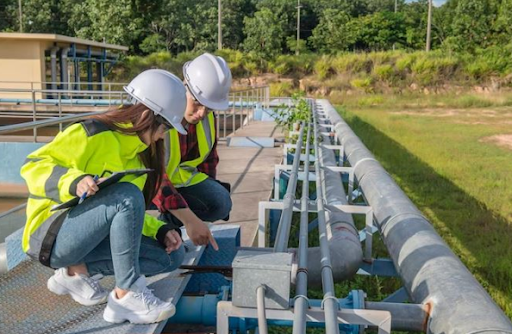A stormwater system is designed to manage rainwater runoff and prevent flooding. It includes a network of drains, pipes, and structures that collect and direct excess water away from streets, buildings, and other areas prone to water accumulation.
Water runs off surfaces like roofs, roads, and sidewalks when it rains and collects pollutants. The stormwater system channels this runoff into drains and sends it to treatment facilities. Here, the water is held temporarily to settle pollutants or treated before being sent into natural water bodies.
Effective stormwater system management involves a combination of infrastructure, regulations, and community practices. Municipalities implement stormwater management plans to control runoff and protect water quality. These plans often include regulations for construction practices, erosion control, and the use of green infrastructure to absorb and filter stormwater.
Tips for Maintenance
Stormwater is a natural part of the water cycle but can lead to various issues when not managed properly. Maintaining a stormwater system is crucial to ensure its efficiency and longevity. Get the help of stormwater system maintenance seattle wa professionals for regular maintenance.
Here are some practical tips for effective maintenance:
● Regular Inspection
Schedule regular stormwater infrastructure inspections to identify any signs of damage or blockages. This can include checking drains, pipes, and stormwater ponds.
● Clear Debris
Keep drains and grates clear of debris such as leaves, trash, and sediment. Accumulated debris can block water flow and increase the risk of flooding.
● Erosion Control
Implement erosion control measures, such as vegetation and retaining walls, to prevent soil erosion. Erosion contributes to sedimentation in stormwater, affecting water quality.
● Public Education
Educate the community about the importance of proper stormwater management. Encourage practices like reducing fertilizers, picking up pet waste, and appropriately disposing of hazardous materials to minimize stormwater pollutants.
● Green Infrastructure
Promote green infrastructure, which helps absorb and filter stormwater naturally. These features contribute to both effective stormwater management and enhanced urban aesthetics.
Drawbacks of Mismanagement
When a stormwater system isn’t managed properly, it can be the reason for some serious problems. Let’s discuss some of them:
- Excess rainwater can flood streets and homes, risks to safety and property.
- Uncontrolled runoff leads to soil erosion, harming landscapes.
- Pollutants like chemicals and debris enter water sources and contaminate drinking water.
- Roads, bridges, and buildings risk damage from erosion and flooding, leading to costly repairs.
- Aquatic ecosystems suffer, leading to a loss of fish, plants, and overall biodiversity.
- Waterborne diseases and contamination of drinking water become potential health hazards.
- Soil quality degrades, vegetation is harmed, and the environment suffers.
- Higher runoff volumes can overwhelm sewer systems, contributing to water pollution.
- Non-compliance with stormwater regulations may result in legal penalties.
- Flooding, infrastructure issues, and health risks disrupt communities, affecting daily life and well-being.
Conclusion
Managing stormwater is important to urban planning and environmental benefits. By understanding how stormwater systems work, people can prevent flooding, protect water quality, and create a safe place for them.
Stormwater management is a shared responsibility that benefits everyone when approached on time. Select the best maintenance team to keep things in good condition.



